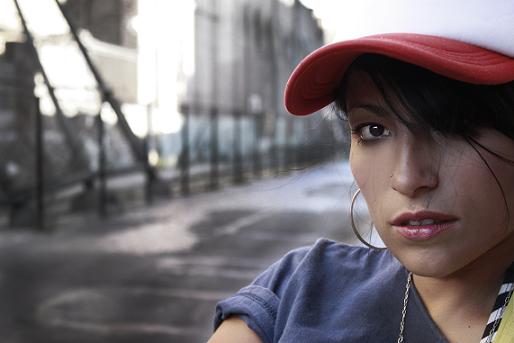As ever and ever the divide grows between what we hear on the radio versus what’s truly fly in hip hop these days, Ana Tijoux plots her coming to America. Born to Chilean parents who fled from the brutal reign of Augusto Pinochet, the MC’s life reads as the manifesto for the counterculture universality of hip hop. How to express the feelings stirred up by moving across the world at 14? How about coming to a country whose democratically elected president was slaughtered, replaced by a dissident-torturing dictator, that happens to be where your parents grew up? Tijoux found her anger reflected in the rhymes of the American rappers of the early ’90s- and shortly after, used their “force” to raise her own voice. She’s been a player on the South American hip hop scene ever since, and is releasing her second solo album, 1977, which may be her most personal project yet, looping scenes from a remarkable life story with her direct, staccato flows. Here in the Bay, we’re getting a chance to catch her beats live (Thurs/25, La Peña Cultural Center), not too long after her debut among the gringos at South by Southwest. She wanted me to tell you that if you were born in 1977, you get into the Berkeley show for free. Read on to our telephone chat with Tijoux, an awesome conversation tweaked but a little by the intricacies of chatting with a translator and my own gradually stiffening Spanish.
San Francisco Bay Guardian: Your family fled Chile to escape Pinochet’s dictatorship. How old were you when your family moved back to? What led them to move back at that time?
Ana Tijoux: I was born in Peru, but after the coup my parents moved to France. I was 14, and it was 1990 when we moved back to Chile. It was always our plan that when we could come back to Chile, we would come back as a family. My childhood was fantastic, but all I knew of Chile were the stories my parents had told me. I had an image of the country, but when I got back, it was very different. There was another way for everything, another way to go to school. Now that I’m older, though, I can see that [adjusting to my new life] was one the things that made me strong.
SFBG: Tell me about how you got involved in hip hop.
AT: I began to rhyme in Chile, but when we lived in France my mother used to work with [homeless teenagers], who loved to listen to hip hop. I used to go with mother to her work and listen to NWA and other hip hop groups from France. I began to listen to hip hop thanks to my mother! In Chile I found the way to say everything that I was feeling through rhyming. I began to rhyme when I was 18 or 19.
Dig Tijoux’s life, animated- and the sexiest Public Enemy tee ever- on the video from 1977’s title track
SFBG: What was the hip hop scene like in Chile back in those days?
AT: What happened with Chile in hip hop, the scene is very strong in relation to the rest of Latin America. It was very strong then, but it’s even bigger now.
SFBG: What, if any, challenges did being a rapera in a budding hip hop scene bring?
AT: There were none. I always felt the support of my friends. I never felt different because I was a female. Maybe there was more respect, they wouldn’t say bad words in front of me. My colleagues were proud there was a woman on stage.
SFBG: Your upcoming tour will be the first time you’ve performed in the United States. What are your feelings on bringing your music up here?
AT: I’m happy and more anxious than nervous, because whenever I travel to another country there’s a new energy. I’ve toured in France, Spain, Switzerland, Argentina, Venezuela, Cuba, Mexico- all over.
SFBG: Is hip hop culture different here in the States?
AT: Of course it will be different- different and similar. But it will be the same music and the same energy.
SFBG: You mentioned in one article I read that you wanted to bring back the hip hop of ’92-’95- what is it about that era that you like?
AT: I feel that hip hop was more simple then, more to the point. It was more personal, the golden age of hip hop. For me, all the albums from that time are classic. I like the force and anger. I’m sure it’s nostalgic too- those were the years I learned I could make something, say what I was thinking. One of my favorite albums is Enter the Wu Tang (36 Chambers), but there are so many good ones.
SFBG: What shows will you be checking out when you’re not performing at South by Southwest?
AT: Flying Lotus.
SFBG: Why’d you name your album 1977— I know that’s the year of your birth, what were you trying to say by invoking that time?
AT: That’s also the name of a song on the album. I wanted to make a number in the album.
ANA TIJOUX
Thur/25 8 p.m., $12-15
La Peña Cultural Center
3105 Shattuck, Berkeley
(510) 849-2568

